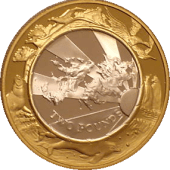The Falkland Islands Pound (FKP) is the official currency of the Falkland Islands, a British Overseas Territory in the South Atlantic Ocean. Here’s a brief exploration of the history and significance of the Falkland Islands Pound:
History:
- Early Currencies: Before the introduction of the Falkland Islands Pound, various currencies were used in the islands, including the British Pound Sterling and the Argentine Peso.

- Falkland Islands Pound Introduced: The Falkland Islands Pound was first introduced in 1833, following the British reassertion of control over the Falkland Islands. It replaced the earlier currencies and became the official legal tender.
- Currency Board System: The Falkland Islands adopted a currency board system, where the value of the Falkland Islands Pound is backed by reserves of foreign currency (primarily British Pounds). This system helps maintain the stability of the Falkland Islands Pound.
Significance:
- Local Use: The Falkland Islands Pound is the primary currency used for daily transactions within the Falkland Islands. It circulates alongside the British Pound Sterling, and both currencies are used interchangeably.
- Fixed Exchange Rate: The Falkland Islands Pound is pegged at par to the British Pound Sterling. This means that one Falkland Islands Pound is equal in value to one British Pound Sterling. The fixed exchange rate provides stability and confidence in the currency.
- Legal Tender: The Falkland Islands Pound is the only legal tender in the Falkland Islands. It is issued by the Falkland Islands Government and has the same denominations and designs as the British Pound Sterling.
- Tourism: The Falkland Islands Pound plays a crucial role in the tourism industry, as the islands attract visitors interested in the unique wildlife, landscapes, and historical sites. The currency is used in various transactions catering to tourists.
- Economic Transactions: The Falkland Islands Pound is used for all economic transactions within the territory, including trade, services, and government expenditures.
- Currency Board Stability: The Falkland Islands Pound’s peg to the British Pound Sterling under the currency board system ensures a stable exchange rate and contributes to economic stability within the Falkland Islands.
- Government Finances: The Falkland Islands Government manages its finances in Falkland Islands Pounds. Budgets, taxes, and expenditures are denominated in the local currency.
- Symbolism of Sovereignty: The Falkland Islands Pound, with its distinct design and local imagery, symbolizes the Falkland Islands’ identity and sovereignty, even though it shares a common peg with the British Pound.
In summary, the Falkland Islands Pound holds historical significance as the local currency introduced during British rule. Its continued use, alongside the British Pound Sterling, reflects the Falkland Islands’ economic ties with the United Kingdom. The fixed exchange rate, stability, and local significance make the Falkland Islands Pound an integral part of the territory’s economic and cultural identity.









